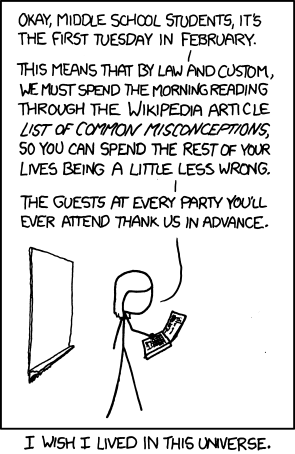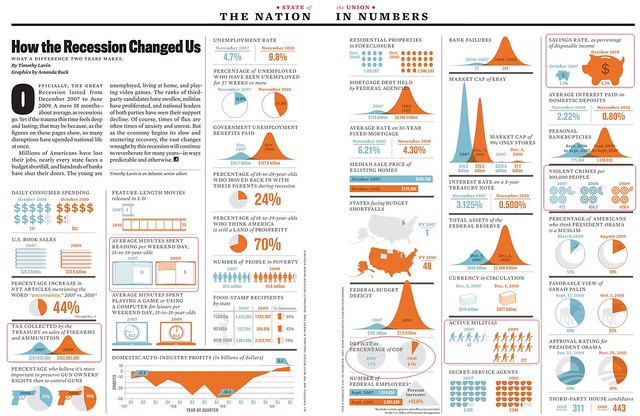Monday, January 31, 2011
Tigers and Longhorns
While I am not normally one to agree with the mainstream media, it is totally reasonable to ask whether "they even have breakfast tacos in Princeton?" The answer, by the way, is sadly "no."
(12) Comments
Sunday, January 30, 2011
"It's getting bigger and bigger all the time"
Stupid is as stupid does
Stupid is as stupid does, and that means, in this case, that the House GOP is in great peril of being stupid.
A House panel chaired by Rep. F. James Sensenbrenner of Wisconsin is scheduled to hold a hearing tomorrow morning to discuss forcing Internet providers, and perhaps Web companies as well, to store records of their users' activities for later review by police.
There are a lot of things wrong with this idea, including particularly that its putative benefit, catching more actual criminals, pales in comparison to the potential for abuse. But never mind the obvious civil liberties implications -- really, the police? -- this is also yet another dubious regulatory burden on business. We elected these people to reduce the regulation on business, not saddle it with onerous new requirements that will cost money, redirect incremental earnings to dead-weight loss rather than new employment, and benefit only the political class. Stop it!
(14) Comments
My whereabouts
No, I have not vanished, but I have been very hither and yon. I flew to Las Vegas on Friday morning (the 7 am flight out of Newark) where I was absorbed in to my company's national sales meeting from my arrival until quite late Friday night. Saturday I grabbed a 6:30 am flight to Salt Lake City for a five hour visit there, returned to Vegas bebeh about 4 pm, and then had one appearance after another until midnight or so again. Flew back today, so "regular blogging" should resume forthwith.
(4) Comments
Thursday, January 27, 2011
Chris Christie vs. Illinois: That's gotta hurt
When New freakin' Jersey thinks it can recruit business away from your state, you know you have a problem. Governor Awesome has gone on the offensive for New Jersey business, and his target is -- and this has gotta hurt -- Illinois!
Yesterday, New Jersey launched a print and audio campaign designed to attract business from other states and its first target was the state of Illinois. The campaign, which attacks Illinois 67% increase in income tax rates and 46% increase in corporate tax rates is calling on the business community there to relocate. The ads include a promise from New Jersey Governor Chris Christie that his administration will not raise taxes and that the state is aggressively pursing economic growth.
The campaign is set to begin this week in some of Illinois biggest markets including Chicago and Springfield, with print ads in most local newspapers and audio ads on radio and television. The action follows an earlier letter writing campaign initiated by Lt. Governor Guadagno which sent appeals to relocate to several Fortune 500 companies and larger businesses with their headquartered in Illinois.
“In New Jersey, we mean business. We’ve said ‘enough is enough’ and made the tough choices to cut spending. By providing a positive, pro-growth climate we are making it easier for businesses to Choose New Jersey and welcoming jobs and economic growth for our residents with open arms,” said Governor Chris Christie.
Here's GA's press release, and here is a pdf of the print ad, which is hilarious unless you pay taxes in Illinois.
Awesome! At the risk of channeling Michelle Obama, for the first time I'm proud to be a Garden Stater.
CWCID: Regular commenter Dawnfire82.
(7) Comments
Chris Christie on public employee unions and fiscal honesty
If you have not seen this exchange between Governor Awesome and a cop who only got a 2% pay raise, you really ought to. In this state, at least, the public employees have literally no idea what it is like in the private economy. They live in a different world from the rest of us (somebody should write a book about that), and smart politicians, the real leaders, are pointing out how out of touch they are.
UPDATE: Rats, the link seems to have gone down, as has the whole site. I'll leave this post up in case it gets fixed. MORE: Fixed now.
(8) Comments
Princeton in the snow
After shoveling out this morning, I took the big camera on an early morning stroll around town and the upper campus before retiring to Starbucks to pump out work.
The TH crib, which took a long time to shovel out thanks to the huge dump from the plow at the end of the driveway. Fortunately, I don't actually need to drive today, I just need the option.
Vandeventer, looking toward Wiggins...
Cannon Green is manifestly white...
Tigers in winter, framing Old Nass...
John Witherspoon, who, in addition to signing the D of I and serving as president of the university, was named after my favorite neighborhood restaurant...
Henry Moore, from a distance...
East Pyne.
A little perspective...
(9) Comments
SOTU blowback: There she goes again
Noted by a reader in the comments to another post, Sarah Palin does it again:
Sarah Palin says watching President Obama's State of the Union address was a "WTF" moment, in more ways than one.
"His theme last night was WTF -- 'winning the future,' " she told Greta Van Susteren Wednesday on Fox News Channel's "On the Record." "I thought, okay, that acronym -- spot on. There were a lot of WTF moments throughout that speech."
That's a nifty parry, right there. You have to wonder whether it occurred to any of the uber-educated White House staff that the acronym for "Winning the Future" could be neatly turned in to populist jab. Perhaps stupid really is as stupid does.
(13) Comments
Calling out the busybodies
Have you ever been the victim of a whisper-campaign that impugned your good name? This is one way to handle it.
(0) Comments
Attention military history buffs and Princetonians
My cousin, the history blogger Greenman Tim, has written a nice post about our revised understanding of the Battle of Princeton, a decisive victory for the good guys in the American Revolution. The different understanding of the war comes from a careful reading of pension applications, which soldiers wrote years after the fact to verify that they had been in the battle and were therefore entitled to the benefits (more on that subject here).
If, of course, you are neither interested in military history or a Princetonian, feel free to move right along.
(1) Comments
The big snow
I like snow. If I weren't supposed to be in Vegas, bebeh, right now I'd be happier about the huge dump of snow last night. Since I am one to look for the best in pretty much everything (OK, other than in the speeches of Barack Obama), I am resolved to enjoy the shoveling and may indeed -- as a bonus to you, our loyal readers -- ramble around town with the big camera a bit later in the morning.
Last night about 8:30, walking out of the Witherspoon Grill (where I had just been the dork at the bar with his laptop), I did grab one artsy shot on my Blackberry.
(5) Comments
Wednesday, January 26, 2011
Morning read: Fact-checking the SOTU
Bloomberg reporters do a nice job of "fact-checking" last night's SOTU and Paul Ryan's response thereto.
For my part, I did not like the sleight of hand on taxes. Is the proposed 1099 repeal actually only a tweak that applies to "small businesses," or is he willing to sign a genuine repeal? Does he regard deferred taxes on foreign source corporate income a "loophole" that needs to be closed, or an essential feature of the corporate tax regime as long as the United States (ridiculously and uniquely among real countries) insists on taxing global income? Almost alone, these two "details" make the difference between sensible proposals and disingenuous hogwash, and yet the speech was entirely unclear.
TaxProf has a pile o' links on these subjects, but on a hurried pass I saw no definitive answer to these two questions. If you think you find the answer, speak up in the comments.
MORE: This article in the WSJ has a lot on the politics of corporate tax reform without much illumination on the details.
(6) Comments
Tuesday, January 25, 2011
State of the Onion open thread
Looking for a place to emote about the State of the Union and the official responses thereto? Express yourselves in the comments to this post. I may jump in with a thought or two myself, if I can work up the kinetic energy.
Updates are numbered.
1. I am ashamed to say that my first comment relates to fellow Princetonian Michelle Robinson Obama's choice of attire. It is undignified and wrong for me to point out that she is far to broad in the hips to wear that pink dress. The wine made me do it.
2. Isn't it awesome that we do not have look at Nancy Pelosi back there? (Dang, I'm catty tonight.)
3. I think Obama just made John Boehner cry. On purpose. He knew damned well what he was doing, right?
4. Egads, Boehner's barely keeping it together back there. Love the pink tie, though.
5. Oh good. Investments in "biomedical research" -- that's my industry, government intervention here we come! -- and "clean energy." "We're not just handing out money, we're issuing a challenge." No, you're just handing out money.
6. "By 2035, 80% of America's energy will come from clean energy sources." Apparently we are including natty gas and "clean coal" among these, so I'm wondering if that is the stretch goal it seems to be. The climate change activists are not going to be thrilled.
7. Nice pivot from the usual tip o' the hat to teachers -- pretty de rigeur in a Democratic SOTU -- to demanding merit assessments. My well-documented objection is this: Meritocracy is inherently incompatible with unionization, so if you do not also attack the teachers unions you cannot honestly claim to support merit assessments.
8. All this infrastructure talk leaves me completely cold. High speed rail? Oh, gawd, that is so pointless in our continental country. And the pat-down joke was no joke -- who is in charge of the TSA?
9. President Obama wants to "simplify" federal corporation tax to close the loopholes and lower rates. I work in an industry with an established track record of no clout, so I am all for that, but what does he mean by "close loopholes"? Get rid of deferrals on foreign income, which he has previously proposed? That would do severe damage to American competitiveness. How about just getting rid of corporation tax?
10. Nice little joke on healthcare reform. And, egads, did he just propose getting rid of the new 1099 requirement? Or was it limited only to "small businesses"? It is damn expensive for big business, too.
11. The airplane engine joke was violent eliminationist rhetoric.
12. Here's a word cloud of the SOTU.
13. Ooh. Medical malpractice reform to reign in frivolous lawsuits! Sadly, I have never met a legislative expert who thinks that is possible because of the clout of the trial lawyers in Congress.
14. "We should ask millionaires to give up their tax break." Bite me. One cannot "give up" a tax break.
15. Biden looks as though he thinks that Obama's promise to veto any bill with earmarks is a joke. Just saying.
16. Tough talk on the Tollybahn, which isn't just a toll road in Germany.
17. Very nice that he called upon universities and colleges to open up to ROTC and military recruiters in the wake of the repeal of "Don't ask, don't tell." That was the problem, right? Not that any of us believed it, so a pat on the back to president for calling out the academic liberals.
18. Is it just me, or this a long speech?
(18) Comments
Obscure Poor Richard proverb of the day
Ben Franklin even had something to say about the impact of regulatory uncertainty on economic growth:
Where there’s no Law, there’s no Bread.
Certain truths have been self-evident for a long time.
(3) Comments
Seasonal Monty Python: The League for Fighting Chartered Accountancy
Most companies are scrambling to finish their end-of-year financial reporting. It is a long and tiring dark of winter process, and no doubt many of the people involved wish they were, indeed, lion tamers. As always, John Cleese got it right years ago...
If only creative academic minds on the FASB -- the people who change the rules every year to raise the costs of preparing financial statements while, at the same time, lowering their utility -- had become lion tamers long ago.
(2) Comments
Sunday, January 23, 2011
Innovation, statist-style
The Obama administration has implemented policies -- both at the Food and Drug Administration and via Obamacare -- that have simultaneously raised the costs of developing and approving new drugs and devices and lowered the expected returns new products in the future. Now it is allegedly worried that the pace of new innovation in drugs is decelerating, so it wants to establish a billion dollar government agency to do the work that the private sector is choosing not to do. Here is how the New York Times spins it (emphasis added):
The Obama administration has become so concerned about the slowing pace of new drugs coming out of the pharmaceutical industry that officials have decided to start a billion-dollar government drug development center to help create medicines.
Yeah, that's a real thigh-slapper for those of us who have been following the Obama administration's war on innovation. Much more burdensome regulatory hurdles for new drugs and devices (exceeding even the requirements of notoriously regulated countries like Germany and France)? Check. A new tax on the revenues of device and drug companies? Check. A Securities and Exchange Commission that has so raised the cost of going public that the specialty pharma and biotech companies -- which do most of the real discovery work for Big Pharma -- cannot raise the prodigious capital required to get new drugs in to the clinic? Check.
So, naturally, the solution is yet another federal agency. Sounds to me like an exciting new employment opportunity for university professors, who are one of Barack Obama's last reliable constituencies.
(27) Comments
Indicting the minimum wage
Warren Mayer, an entrepreneur and fellow Tiger who writes the excellent Coyote Blog, makes the best argument against the minimum wage. Read the whole thing if you harbor any notion that the minimum wage is good public policy.
(3) Comments
Favoriting the NFL
This year, of the final four NFL teams, I have a very clear sense of the exact order of my preferences to get to and win the Super Bowl. Therefore, in order: Bears, Packers, Steelers, and Jets.
How do you order the final four? Rank the teams in the comments.
(9) Comments
Numbers
Regular commenter Bomber Girl sent along a graphical compendium of factoids from the Atlantic. I have circled the items that are either interesting or problematic, as in suspect. Of course, your results may vary.
Specifically: How did the number of minutes a day that teenagers spend "reading" decline so much? Did the ammo tax go up, is the gummint doing a better job of collecting the existing tax, or are ammo sales actually up that much? Much as we all like complaining about Dubya's spendiness, as a percentage of GDP his last deficit was less than 20% as big as Obama's. The number of active militias has tripled? I blame Sarah Palin. The rate of violent crime is dropping even as the economy gets worse. Poverty might not be the whole story after all. And look at that savings rate!
Click here for a bigger version.
(8) Comments
Saturday, January 22, 2011
From the archives
Saturday night thought provocation
Tom Maguire neatly links the American obesity epidemic on the government, and wonders about its connection to global warming. Speaking of nice pivots...
(1) Comments
Are you home alone on Saturday night?
If you are home alone on this Saturday night, you certainly have the time to check out AdFreak's "30 Freakiest Ads of 2010." Egads.
Oh, and the Germans are weird. Just thought I'd put that out there after seeing the, er, "bicycle seat" commercial.
(0) Comments
Saturday afternoon country
I love this song. Indeed, I agree with the commenter who wrote that "if you don't like this song the terrorists win."
(6) Comments
Conservation of bogeymen
Are you ever worried that we all need something to worry about? Something big and global that substitutes for the Devil and Hell? Behold, the output of a Google Labs search query -- books about nuclear war and books about climate change, by year, over time. I suspect that if the investigator had layered in books about overpopulation and famine and resource exhaustion there would have been another peak between 1960 and 1980, centered around 1973 or so.
What's next?
(6) Comments
Not feeling it..
Lost in the wake of the horrific shootings in Tuc son was a modest battle in the culture war: The State Department quietly decreed that some passport applications would henceforth be gender neutral. No more "mother" and "father"; such terms were apparently too retro, too judgmental for the Foggy Bottom bonzes. Instead, Parent One and Parent Two would do just fine.
Previously, I thought passports were simple tools, records that allowed people to travel freely between countries; a transparent description of citizenship and identity that could be understood worldwide. Silly me. They apparently contain "thousands of years of cultural history".
Henceforth, I would like "thou shalt not covet thy neighbor's ass" holographically imprinted on my driver's license. Let us not throw our traditional aversion to ass-coveting under the bus of political correctness.
In addition, while we all have fun with Godwin violations on the House floor, can we tone down this rhetoric?
But cultural vandalism is the order of the day. Like the Bolsheviks rampaging through the manor houses and dachas of the nobility after the Russian Revolution, the PC police gleefully consign history to, well, the ash heap of history, confident that they're in the service of . . . what, exactly?
I'm in favor of preserving Huck Finn, and verbally scandalizing the neighbors in general, much more than the next guy. But perhaps the Russian Revolution analogy is a bit overwrought?
(3) Comments
Friday, January 21, 2011
Special state dinner Caption This!
The official caption is not very illuminating:
U.S. Secretary of State Hillary Clinton raises her glass for a toast during a State Dinner in honor of China's President Hu Jintao at the White House in Washington, January 19, 2011.
I think we all know that you could have done, and still can do, much better.
(20) Comments
Thursday, January 20, 2011
Saddam Hussein is back in the news
There is new news on Saddam Hussein, with the declassification of captured Iraqi documents. Today's New York Times has a story about Saddam's diplomatic efforts to head off or deflect the American counterattack in 1991. The headline, on page A10 in the paper version, tells us absolutely nothing we did not already know: "Hussein wanted Soviets to head off U.S. in 1991."
The article itself does, however, contain this nugget:
With only fragments of information coming from the battlefield and a room full of subordinates eager to applaud the faintest glimmer of success, Mr. Hussein was convinced that the United States lacked the resolve to wage a grinding ground war, the transcripts show.
This was neither the first nor the last example of Saddam failing to understand his own military position and that of his adversary and acting recklessly as a result. As one Clinton administration alumnus put it, "Saddam is also one of the worst gamblers and risk takers in modern history[, and his] behavior is ... completely unrestrained by the Iraqi political structure.... Saddam's foreign policy history is littered with bizarre decisions, poor judgment and catastrophic miscalculations." For example:
In October 1973, Egypt and Syria launched a sneak attack on Israel, surprising the rest of the world, including the Iraqis. While most other Arab states sent a brigade or an air force squadron to show solidarity, Iraq sent an entire armored corps and about a hundred aircraft. By the time the Iraqis reached the Golan heights, the Isrealis were there to destroy them. In 1974, Saddam abrogated the "March Manifesto," which had granted the Kurds (who had the backing of the United States, Isreal and Iran) limited authority back in 1970. Saddam sent in his army having concluded, incorrectly it turns out, that the Shah would not intervene to help the Kurds. This conclusion was essential to Saddam's decision to invade Iraqi Kurdistan, because at the time the Iranian military was substantially more powerful than Iraq's. Contrary to Saddam's expectations, Iran invaded. Saddam was ultimately forced into signing the Algiers Accord of 1975, which guaranteed Kurdish autonomy (once again) and, for the Shah's troubles, recognized all of Tehran's disputed territorial claims against Iraq (including the Shatt al-Arab waterway). In 1980, Saddam invaded Iran, beginning a war that would last eight years. Saddam was concerned that revolutionary Iran would spark a revolution among Iraqi's majority Shia. Rather than crack down internally (which we know he was more than willing to do and did successfully for almost thirty years) he decided to attack a much larger and better armed country that was in the grip of a revolutionary fervor. He launched the invasion with no real planning, and his army was stopped by paltry Iranian resistance after having achieved exactly none of its objectives. By January 1981 Iran was counterattacking (also incompetently, but successfully nonetheless), and it eventually devestated that generation of the Iraqi army. Iraq was only able to stop Iran through the routine use of chemical weapons, including in encounters where they conferred no tactical advantage. Apart from grievously miscalculating the risks of invading Iran, which decision itself casts doubt on whether Saddam had the judgment necessary to be deterrable, Saddam repeatedly made insane decisions during the course of the war. Specifically, when things started going bad for the Iraqis on the battlefield, Saddam began lobbing missles into Iranian cities. The problem, though, was that Iran's significant cities were much further from the border than Iraq's population centers, so Iran was able to retaliate against Baghdad with much greater destructive force than Iraq was able to deliver against Iranian civilians. These exchanges would "go on for weeks or months before Saddam would realize that he was taking more damage than the Iranians and so would halt his attacks." Saddam would never learn this basic fact of that war: he would initiate city-exchanges with Iran seven times during the war (July-August 1982, October 1982, December 1982-January 1983, February 1984, March-June 1985, January-February 1987, and August-September 1987), "each time with the same results." If ever there was evidence that Saddam could not be deterred by mutual assurred destruction, this was it. After only two years of peace, Saddam again took his country to war when it made no sense to do so. In 1990, we understood --correctly -- that Saddam's chief concerns were his country's growing internal economic problems, the unchecked power of the United States, and his own stature within the Arab world. Invading Kuwait was so obviously idiotic in light of these interests that Western analysts ignored the warning signs, and persistently doubted that Iraq's mobilization toward its southern border was anything more than the rattling of sabres. But invade he did. We learned years later that Saddam "had concluded that there was a high probability that the United States would oppose an invasion of Kuwait militarily and he believed that he could defeat the expected American response."
There were those who argued in advance of the invasion of Iraq in March 2003 that it would have been possible to deter Saddam even if he did have weapons of mass destruction. Deterrence, though, requires that the parties understand the situation they confront and have normal ability to assess risk. Saddam had neither understanding of basic military matters nor good judgment. His record of totally irrational risk-taking, revealed again in the linked article, reminds us that Saddam probably could not have been deterred. Certainly no American president could look at his 30 year history and decide that he was rational. In this regard, Saddam's Iraq was different from every other threat we have recently confronted. The Soviets, the Chicoms, the Iranians, and even the North Koreans have evinced more intelligence and rationality in their brinksmanship than Saddam ever did. All the evidence argued that Saddam could not be deterred, only interdicted. As a result, American choices in 2002-2003 were not nearly as palatable as many who opposed the war argued at the time, or still argue in retrospect. That is, I think, why the Clintons supported George W. Bush's Iraq policy until it became politically untenable to do so.
(8) Comments
Wednesday, January 19, 2011
An immediate test of President Obama's "new" approach to regulation
Yesterday, President Obama signed an executive order making it the "operating principle of our government" that regulation "strike the right balance" between its protective function and stifling economic activity, immediately inviting the question: "Why does the federal government need to be ordered to do that?"
Be that as it may, today at 12:15 we will get an immediate test of President Obama's sincerity. Per an email from a Wall Street device analyst, the Food and Drug Administration has scheduled a "media briefing" to issue "a list of 510(k) pre-market program reforms that it intends to implement in the near-term." The 510(k) program is the principle means by which the FDA clears medical devices to be sold in the United States. Last year the FDA announced its intention to increase the testing burden on new device clearances, which in turn will increase the cost of clearance and the time to market (itself a cost). While this might be good news for companies with established products (because there would be a new barrier to competition), the proposed "reform" promised to increase the financial return "hurdle" required for any new medical device to attract capital. In short, the FDA's proposals would entrench previously cleared products and keep new products that are approved for sale in such libertarian paradises as France and Germany from use in American patients, sometimes for years and in other cases forever.
It will be interesting to see whether the FDA read President Obama's order.
(5) Comments
Tuesday, January 18, 2011
A "smart regulation" point of interest
President Obama needed the Wall Street Journal this morning. He published an op-ed piece that called for a more sensible approach to regulation, and he obviously wanted to bask in the Journal's brand equity -- no other publication reaches so many corporate tools, and no other really big media outlet has such a pro-business editorial attitude. Bloggers have been having a field day.
It is curious that the president chose the Food and Drug Administration as the object of his first anecdote, to wit:
But we are also making it our mission to root out regulations that conflict, that are not worth the cost, or that are just plain dumb.
For instance, the FDA has long considered saccharin, the artificial sweetener, safe for people to consume. Yet for years, the EPA made companies treat saccharin like other dangerous chemicals. Well, if it goes in your coffee, it is not hazardous waste. The EPA wisely eliminated this rule last month.
President Obama sees this as an example of wisdom in regulatory reform. Normal people are aghast, even agog, that the federal government regarded saccharin as a "hazardous waste" in the first place. Barack Obama missed the perfect opportunity to admit to some normality, if that were his inclination.
President Obama's op-ed comes on the same day as the release of a new report from PWC, the largest public accounting firm in the world (and, I should say, the auditor of the TigerHawk Employer's financial statements), the gist of which is that the United States is losing its competitive edge in medical technology. One of the reasons, according to the press coverage:
The report also touches on increasing demands placed on U.S. med-tech companies by the Food and Drug Administration, which regulates the industry. In this area, France, Germany and the United Kingdom rank higher than the United States because they "provide more supportive regulatory processes that encourage innovation yet ensure safety and effectiveness on a timely basis."
Ain't that the truth. When your regulation is more anti-innovation than the French, you know the pendulum has swung too far. Of course, Barack Obama will never confess that the new, er, "diligence" of the FDA toward medical devices is a policy of his appointees and his administration. In addition to a general antipathy toward enterprise, the health care "reformers" that drive Obama administration policy in the field believe that innovation in medical technology drives cost. Which, of course, is bad.
All that said, I wish that the president would stop catering to the Fortune 500 tools. These are not the companies that innovate. They don't create a lot of American jobs in the long run, they are big enough to lobby for legislation to protect their entrenched businesses, their CEOs consort with politicians partly for the fun of it, and they are in general willing and inevitable participants in the government-corporate complex. If President Obama really wants to motivate business, he will start paying attention to the next several thousand companies, which are the real engine of growth and innovation in the great American prosperity machine.
(9) Comments
Jurassic beer
Dork confessional moment: This is cool, both as a concept and that somebody turned it in to a quest:
A Cal Poly professor’s mission to turn a 45-million-year-old yeast into an ingredient for a beer has proven successful — and now he hopes to grow his operation locally.
Raul Cano, a Cal Poly biology professor, discovered the yeast in amber that came from Myanmar, which was previously known as Burma, while conducting research in the 1990s.
Apparently these little yeasties are different from their modern kin:
Despite initial skepticism from some about the taste the beer would produce, Cano says the flavor turned out surprisingly good and unique.
Critics have described the taste as one with lots of spice, resembling cloves, along with tinges of ginger and pineapple.
One thing that makes the yeast different is its genetic makeup — which allows the beer to finish with a desirable clear color instead of a cloudy resolution because of how the prehistoric yeast strain ferments sugars, Cano said.
My question: Were these "critics" on loan from the wine division? "Resembling cloves, along with tinges of ginger and pineapple"? Seriously?
(9) Comments
Don't text and walk
Never mind not texting and driving. Don't text and walk...
I admit, that could happen to me even if I weren't texting. Yes, I am just that oblivious.
(2) Comments
Ugly unexplained illness of the month
Monday, January 17, 2011
Grid work
Centrally-planned, declining R&D, government regulated and old: Despite all of this the U.S. electrical grid is becoming more prone to outages? Shocker.
I know nothing about the electrical grid other than what I read in the popular press from time to time, it seems more probable than not that these two statements are true:
It is very depressing.
(7) Comments
Whence the "scandal culture" in American politics?
Who was the first modern president known to hire burglars to destroy his opponent? The sainted John F. Kennedy. We are, arguably, still living with the consequences.
(3) Comments
The climate of hate continues
When things like this happen, we have to examine ourselves closely in the mirror. Even if, deep down, we indulge in the secret admission that we loved it.
(5) Comments
Sunday, January 16, 2011
Mental health policy and Tucson
David Shern of the Health Affairs Blog looks at the Tucson attack through the prism of mental health policy. As somebody who has had unfortunate occasion to explore our system of health care finance in connection with behavioral disorders, I absolutely agree that our system for treating mental illness is far less advanced than for physical ailments. This, notwithstanding that many, even if not all, mental health problems are originally physical.
The ugly truth is that Americans often over respond and over spend for medical health problems (that is, getting a poor return for money and time spent), but largely ignore mental health problems until they do damage, whether that damage is to the patient, his or her family, or innocent people at the wrong place at the wrong time.
(8) Comments
Governor Awesome on speaking the truth
Your Sunday afternoon Governor Awesome video:
Not sure about the absence of hating that he claims for New Jersey, but it is true that you rarely see the really vitriolic protests here that you get in other places. People are too exhausted from fighting the traffic to really go nuts when they get to the demonstration. And, of course, there is no universally consumed New Jersey media outlet, so no central source of information to drive publicity.
(3) Comments
The kinder, gentler, sunnier gulag
If the old Soviets had thought of putting tanning beds in their prisons, it would not have been nearly as tough to negotiate the Helsinki Accords. And, being an actor, Ronald Reagan almost certainly would have approved.
(0) Comments
Icing the kicker
Asking the important questions: Does "icing the kicker" actually work? Or does it only appear to work?
Discuss amongst yourselves.
(4) Comments
Don't lighten up
Elle Magazine has some serious pigmentation issues. Egads.
One need not be politically correct to raise an eyebrow at the "lightening" of images of non-Caucasians for aesthetic reasons. Yeah, some might say it is the same as Photoshopping a tan on a Swede, but I wonder whether the motives are the quite the same.
CWCID: The Emirates Economist.
(4) Comments
Housekeeping note
While watching the Bears roll over the Seahawks, I cleaned up my blogroll. First time in at least two years, maybe more. Mostly, I tweaked with the coding so it would display properly on Chrome, which I now use as my principal browser, but I also culled dead links and generally dusted the place.
The truth was, the display on Chrome was so messy that I stopped clicking through my own blogroll for reading, so I fell out of touch with a lot of good blogs, including lefty blogs, that I used to read and link to. We shall all see whether a neat blog roll changes my own behavior. In the mean time, scroll down the sidebar and start clicking. There is some good stuff out there.
(0) Comments
SOX and the financial crisis
From the always amusing morning links over at Maggie's, this observation from Professor Bainbridge about SOX and the financial crisis:
The strict conflict of interest rules embedded in the new definitions of independence made it difficult for financial institutions to find independent directors with expertise in their industry. A survey of eight US major financial institutions, for example, found that two thirds of directors had no banking experience. Given the inherent information asymmetries between insiders and outsiders, the lack of board expertise significantly compounded the inability of financial institution boards to effectively monitor their firms during the pre-crisis period...
In addition, the need to find independent directors put an emphasis on avoiding conflicted interests at the expense of competence. In other words, the problem was not just that the new definition of independence excluded many candidates with industry expertise, it was also that the emphasis on objective indicia of conflicts dominated the selection process to the exclusion of indicia of basic competence and good judgment.
Indeed, and dare I say, "obviously." With regard to the first point, in complex and intertwined industries competence and experience, on the one hand, and conflicts of interest, on the other, are directly correlated. There is virtually no avoiding it. That is why, for example, command and control regulatory agencies almost inevitably become "captured" by the industries they purport to regulate. Many businesses require such specialization of knowledge that there simply is no way to hire capable regulators (or, in private sector governance, directors) who are free from some technical conflict of interest. The real question in vetting directors or regulators ought not to be whether there are such conflicts, but whether the candidate is of sufficient character that he or she will act responsibly notwithstanding. Unfortunately, the lawyers and journalists who attack these conflicts have a self-interest (winning a lawsuit or attracting an audience) that drives them to ignore considerations that matter -- such as character -- that are difficult to prove. In fact, the directors who have the "cleanest" records from a conflicts point of view -- academics and other theoreticians -- lack the crucial practical experience that is the core requirement of an effective director.
And, I might add, academics and other "conflict-free" directors are a lot more concerned with losing their income from their board seats than currently working CEOs and CFOs, for whom the director fees are unimportant (because they have large incomes anyway). The inherent conflict of incumbency weighs much more heavily on people who are not already rich, and is much more likely to influence their opinions. But that is hard to document, so the natterers ignore it and focus on minor if meaningless financial conflicts that they can "prove."
(0) Comments
From back in the day
I eat out a lot, especially so in the last few months because I am building a new kitchen and am reduced to a refrigerator, microwave, toaster and coffee pot at one end of my living room. So it was last night, when I ventured forth to find a seat at a bar in town and watch the Packers and catch up on this year's Barron's roundtable (yeah, I'm *that* fun on a Saturday night). Anyway, my favorite places were packed, so I went to the Yankee Doodle Tap Room in the Nassau Inn, which has a decent bar and beer selection but sufficiently lame food that I go there only as a last resort. On that score, I ended up pleasantly surprised, insofar as my cheeseburger was pretty good and the sweet potato fries, which are easy to screw up, were very respectable. So the Tap Room may be pumping out better food, which would earn it a spot in the regular rotation, at least until I get my kitchen back.
The Tap Room has one other attribute, which is that it is lined with photographs of famous Princeton alumni from back in their day. Most of them are, of course, preppy-looking white guys, but there are obvious exceptions:
I'm sure most of us regret the hair cut we sported in college.
(9) Comments
Saturday, January 15, 2011
There are two types of people in the world...
One side of American politics considers the modern welfare state — a private-enterprise economy, but one in which society’s winners are taxed to pay for a social safety net — morally superior to the capitalism red in tooth and claw we had before the New Deal. It’s only right, this side believes, for the affluent to help the less fortunate.Apparently, nobody thinks that a smaller state helps the little guy, or that medical and health benefits for all is more than a safety net, or that government could be simultaneously more limited and more effective, or even subscribes to the empirically well-supported notion that a state that promises too much risks massive failure in its most basic promises. Furthermore, Krugman knows this because of his intimate knowledge of the intentions and thought processes of "the other side" (reminding us of Arnold Kling's 'Type M' argument). Krugman's "fundamental disagreement about the role of government" is a light switch with no dimmer - entitlements for all or full-on social darwinism.
The other side believes that people have a right to keep what they earn, and that taxing them to support others, no matter how needy, amounts to theft. That’s what lies behind the modern right’s fondness for violent rhetoric: many activists on the right really do see taxes and regulation as tyrannical impositions on their liberty.
There’s no middle ground between these views.
Of course, in the process of polarizing a continuum of thought about the proper and effective scope of government, Krugman can also create a strawman:
In a way, politics as a whole now resembles the longstanding politics of abortion — a subject that puts fundamental values at odds, in which each side believes that the other side is morally in the wrong. Almost 38 years have passed since Roe v. Wade, and this dispute is no closer to resolution.Funny, almost everyone I know can see both sides of the abortion debate, and I live in Krugman's hometown. There are certainly those who are moral absolutists about it. Still, they have a normative belief that a human life begins in the womb. That's a bit different than having an opinion about which government policies will lead to the greater good. But then again Krugman doesn't believe that anyone who disagrees with him wants to enhance the greater good. They just want to kill babies..er...or old people..er..or puppies! Damn puppy killers.
Yet we have, for the most part, managed to agree on certain ground rules in the abortion controversy: it’s acceptable to express your opinion and to criticize the other side, but it’s not acceptable either to engage in violence or to encourage others to do so.Krugman returns to his favorite themes here -"eliminationist rhetoric", a form of political speech that he can recognize but not clearly define, and the thoroughly debunked notion that such speech has something to do with actual domestic violence. Of course, he's discovered "eliminationist rhetoric" in his wide-ranging primary research on the other side of the ideological tracks but he is, apparently, unread in other field research classics by distinguished rhetoric anthropologists.
What we need now is an extension of those ground rules to the wider national debate.
Right now, each side in that debate passionately believes that the other side is wrong. And it’s all right for them to say that. What’s not acceptable is the kind of violence and eliminationist rhetoric encouraging violence that has become all too common these past two years.
So this is a very sad and narrow-minded piece of rationalization in the end, too pathetic to enrage. Krugman has revealed his own emotions-driven thought process in the mirror image he creates of "the other side". We know that very few get up in the morning thinking "I'm going to be a selfish bastard today", yet he looks at his reflection and sees millions of them. As the shrinks say, "very interesting".
Have the inhabitants of Bizarro World finally broken through to Earth? Krugman offers, with no apparent sense of irony, a columnproclaiming the virtues of the modern welfare state and a Times magazine article explaining the collapse of the modern welfare state. It's two Krugmans in one!
(17) Comments
Friday, January 14, 2011
More Governor Awesome: On "two strong-willed Italian guys"
Chris Christie on "Good Morning America," discussing his policies and Rudy Giuliani's jab over snow clearance.
It is a measure of Christie's rising prominence in the Republican Party that Giuliani felt the need to poke him. It is perhaps a measure of Christie's ambition that he gently tweaked Sarah Palin over the "blood libel" comment. "Perhaps," because it is equally or even more possible that Christie was worried that too strong a defense of Sarah Palin would not sit well with New Jersey voters, who do not think very highly of her.
Finally, I did not know that "one in five" new American private sector jobs in November were created in New Jersey, but it rings true. The employment market here is definitely heating up. I am less certain the local recovery is yet a function of Christie's policies -- the booming stock market is probably the more proximate cause -- but I do not begrudge him the credit.
(8) Comments
Because I know you care...
The Borough of Princeton finally issued the amendment to my already-issued building permit after about six weeks, wasted time during which I have been living without a kitchen and, recently, a bedroom. For this outstanding service -- one wonders how long it will take if the economy actually heats up -- I paid a "building permit fee" of $2,127, and a mandatory "affordable housing fee" of $416.
Of course, the "affordable housing fee" makes housing less affordable. Either the people who name such things are idiots, or they think we are fools. One struggles for a third explanation.
And, no, it is not the builder's fault.
(8) Comments
Annals of New Jersey politics: The bicycle tax
Two days ago, New Jersey Assemblywoman Cleopatra Tucker (D-Essex County) introduced a bill to impose a $10 tax on every bicycle in the state, and require it to bear a license plate to be obtained from the Department of Motor Vehicles. The putative concern was that kids on bikes had knocked over some old folks and license plates would make it easier to identify them after the crime. But the bill did a lot more than that:
Had the bill gone through, all bikers registering their "vehicle" would have had to provide information such as the year, model, color, weight, serial number, owner’s address, date purchased and amount of state sales tax they paid on it, reports NJ.com.
Yeah, because knowing the amount of state sales tax paid will make the hit-and-run biker kids so much easier to identify.
My question: I thought Democrats wanted us to ride bikes to, you know, save the planet and whatnot, and here they want to tax them. I'm confused. I'm baffled.
Fortunately, hue and cry paid off. Yesterday, after every cyclist (and quite a few couch potatoes) in the state mocked her, Assemblywoman Tucker withdrew her bill. Bullet dodged, especially by the road bikers who spent an extra $100 to shave three ounces off their seat, which would have been more than nullified by the Garden State license plate flapping in the breeze underneath.
(11) Comments
Thursday, January 13, 2011
Governor Awesome on political discourse
Below, New Jersey's Governor Chris Christie's remarks on leadership, "fear," and civility in politics following Arizona. As usual, I think he hits the head with a nail.
(5) Comments
Personal money management advice from 1737
Scrolling through some of Poor Richard's lesser known proverbs -- there were more than 600 -- we find this bit of advice that millions of Americans would have done well to heed over the last twenty years:
He that sells upon Credit, expects to lose 5 per Cent. by bad Debts; therefore he charges, on all he sells upon Credit, an Advance that shall make up that Deficiency.
Those who pay for what they buy upon Credit, pay their Share of this Advance.
He that pays ready Money, escapes or may escape that Charge.
I don't think it is too risky to say that Ben Franklin would not have approved of credit cards.
(1) Comments
A short note on the Tucson speech
In the cold light of morning, Tom Maguire did not love President Obama's Tucson speech quite as much as the chattering classes and even many conservatives. I saw it in real time, and had two reactions. First, it was careful, insofar as the president artfully told everybody what they wanted to hear. Well, good, it was a memorial service, after all. Nobody wants a lot of truth-telling at a funeral. Second, the president together with the crowd veered dangerously close to the edge of excessive exuberance when he recognized the heroes of that sad day. The crowd reacted to each story boisterously, and for a moment Obama almost joined in. You could see him smiling and pumping out more enthusiasm, and then he suddenly dialed it back, almost as though he saw the peril. One more step and he might have gone over the edge, but he did not and it was in the end a fine speech.
Unless, of course, you have too good a memory.
(5) Comments
Wednesday, January 12, 2011
Another benefit of the new liquidity bubble
Massive deficit spending and monetary stimulus may not be enough to overcome the Obama administration's suffocating regulatory policy, but it makes for a lot of dollars chasing too few shares of stock. The market is rolling ever higher even while business turns its attention to rewriting proxy statements and "improving" its "governance" and other such deadening activities. The hope is that the wealth effect will cause the rich, at least, to spend some money. There is some evidence this might be happening.
There is another benefit to the monetary rally in the stock market, and that is that it is making it easier for the government to make a "profit" on the equity positions it took as part of the TARP in 2008-2009. Even AIG, which was dead as dead can be two years ago has recovered to such an extent that the government might well make back its money.
Bob Benmosche, AIG’s chief executive, told the Financial Times the deals “clearly show that US taxpayers will get all their money back and they will make a nice profit on it”.
The government will make a profit if it sells its AIG shares for more than $29 apiece. Shareholders holding the warrants will profit if the shares are above $45. AIG shares closed at $58.40 on Wednesday.
I am man enough to admit that while I supported the TARP with great reluctance I also did not think it was possible that AIG would survive. Little did I realize that the federal reserve would pump so much liquidity in to the economy that even AIG would inflate its way to solvency, and then some.
(6) Comments
Corporate propaganda even I do not believe
There are few bloggers on the right or left who stand up for business, even big business, as resolutely as I do, and even fewer who have anything good to say about Goldman Sachs, a firm I rather admire. But even I don't believe this.
(2) Comments
Tuesday, January 11, 2011
The "Native American Electrician Training Program"
Hmmm. Something tells me that the long arm of the federal government is involved in the "Native American Electrician Training Program."
That said, I am all for worker training programs, even at the hands of the feds. Teach a man to fish and whatnot. And I am more sympathetic to the ethnic interests of American Indians than any group that came here voluntarily. So I suppose I'm all good. Employee a Native American electrician today!
Oh, wait, that would require a need for electricians. I would need an electrician if only my own town's (Democrat) government took less than a geologic age to issue a straightforward building permit. Do you think the Borough of Princeton would pick it up a bit if I promised to hire Native Americans to do the job?
(12) Comments
Monday, January 10, 2011
A taxonomy of left-wing "hate"
Not at all saying who started it -- one can only imagine the intensity of righty vitriol during the Clinton administration if there had been blogs then -- but the idea that harsh political rhetoric and imagery is the province of the right is, well, a lie. Take this trip down memory lane and report back.
(8) Comments
The greatest trades
Herewith, Barry Ritholtz's list -- there I go again -- of the ten greatest market trades of "all time." I had heard of six of them (1-5, 9). Of the "honorable mentions" that Barry proposes, I note that I invested my summer job money in the summer of 1982 in Hillenbrand Industries, and still own the descendants of those shares. It is up roughly 25 times, excluding dividends. Sadly, my stake was only large by my standards. Oh, the fortunes we might have made.
In any case, I don't see how any such list can omit Nathan Rothschild's trades following the Battle of Waterloo (and here you thought "Trading Places" was just comic genius).
MORE: A commenter says that Nathan Rothschild's "Waterloo" trades are a myth. A pretty awesome myth, but reason enough to leave them off the list.
(5) Comments
Sunday, January 09, 2011
A short note on airline travel morality
Of all the legal and non-accidental things one might do on a passenger airliner, is there anything less moral than putting your bag in a bin toward the front of the plane when your assigned seat is in the rear? I see this fairly often -- some guy who has a coach seat in the back but early-boarding privileges does not want to schlep his wheeled bag to the rear, so he puts it over another row toward the front and then waltzes to the back unencumbered. On a full flight, this is terribly anti-social, because it forces a late-boarder with a seat near the front to put his or her bag in the back. That (obviously) imposes a long delay in disembarkation on that passenger, all because the inconsiderate early boarder lacked the energy -- physical and moral -- to hump his bag to the back.
I would call for the death penalty for such people, but if one of them is killed I would not want to be attacked on CNN for my eliminationist rhetoric. I therefore ask only that they be flayed.
(14) Comments
Stratfor's "top ten geopolitical events" of the last decade
I'm a sucker for lists, the more important the better. Herewith (interactive file), Stratfor's "top ten geopolitical events of the last decade". The attacks on September 11, 2001 are at the top of the list, and President Obama's "surge" in Afghanistan is at the bottom. There is a lot in between.
(2) Comments
Job tenure
From a consultant's email with interesting employment factoids, the "job tenure" gap seems to have closed:
The median length of time that full-time workers stay in their jobs ticked up slightly in 2010, to just over five years, continuing a slow increase in job tenure that began in 2004, according to a report by the Employee Benefit Research Institute (EBRI). However, the EBRI analysis shows there are also significantly different long-term trends by type of worker. For instance, job tenure for men has been falling since 1983, while women's tenure has been rising over that period, to the point where the once-big gender gap in job tenure has now almost closed. Because women's tenure has been increasing while men's tenure has been falling, the overall job tenure rate has been relatively stable. EBRI also found that older workers appear to be staying in their jobs longer. But overall, the results show that the American work force over the past three decades has always had a high level of turnover, and probably will in the future as well. "For the great majority of American workers, so-called 'career jobs' never existed, and they certainly do not exist today," said Craig Copeland, EBRI Senior Research Associate, and author of the study. "A distinct minority of workers have ever spent their entire working career at just one employer."
I wonder how much of the increase in average job tenure is purely or largely a function of demographics. The American working population is aging, at least until baby boomers retire in large numbers. Do older people, who may have exorcised their ambition demons and have a harder time getting new jobs, switch jobs less often younger employees?
(0) Comments
Facebook status of the day
James Taranto, on Facebook a few minutes ago:
"Maps don't kill people, people kill people."
Talk amongst yourselves.
(9) Comments
But was she wearing a short skirt?
Justice, Saudi style:
JEDDAH – A 23-year-old unmarried woman was awarded one-year prison term and 100 lashes for committing adultery and trying to abort the resultant fetus.
The District Court in Jeddah pronounced the verdict on Saturday after the girl confessed that she had a forced sexual intercourse with a man who had offered her a ride. The man, the girl confessed, took her to a rest house, east of Jeddah, where he and four of friends assaulted her all night long.
The girl claimed that she became pregnant soon after and went to King Fahd Hospital for Armed Forces in an attempt to carry out an abortion. She was eight weeks’ pregnant then, the hospital confirmed.
According to the ruling, the woman will be sent to a jail outside Jeddah to spend her time and will be lashed after delivery of her baby who will take the mother’s last name.
No, all Muslims do not believe in whipping rape victims. Perhaps most don't. But Saudi Arabia sits at the geographical and spiritual center of Islam. If this sort of thing happened in Rome or Jerusalem in the name of God is there any doubt that Christians and Jews around the world would rebel and try to force a change? Why is that not happening in Islam? Is it because Muslims in other countries do not see it as a problem worth addressing, or is it because they are afraid of retaliation? What would be the third explanation?
Release the hounds.
(9) Comments
A short note from Poor Richard
Surfing through some of the lesser-known proverbs of Poor Richard, I stumbled across this:
Blame-all and Praise-all are two blockheads.
First, as true today as in 1734. Second, who knew that Benjamin Franklin used the word "blockhead," which -- along with "bonehead" -- is one of my favorite condemnations.
(1) Comments
Saturday, January 08, 2011
Arizona Saturday
A friend and I spent the middle part of the day walking the Huckaby trail near Sedona, Arizona and then repaired to a bar and then took a nap, and so it was we missed the tragic news of the killings -- assassinations and attempts thereof, actually -- elsewhere in the state. I did take the time to scroll through my Facebook page, and decided not to react to the eruptions from my many liberal Friends (virtually all of whom are actual friends). The truth will out. Rather than add my own ignorant voice to the cacophony on that vile act, herewith some more peaceful reflections on this Arizona Saturday.
(12) Comments
Sedona at dawn
Friday, January 07, 2011
The "40 most obnoxious" quotes of 2010
A list of the "40 most obnoxious" quotes of 2010, from a certain point of view. Sort of a blog-reader's trip down memory lane.
(2) Comments
The new rules of the House
Big Four accounting firm Deloitte has prepared an interesting analysis of the new rules of the GOP-controlled House of Representatives, at least as they pertaining to taxing and spending. This seems like the big news:
What House GOP leaders are calling the cut-as-you-go (CUTGO) approach effectively prohibits the House from approving legislation that uses tax increases to pay for new spending priorities. It stands in stark contrast to the previous House payas-you-go (PAYGO) rule, which permitted new tax cuts or mandatory spending increases to be offset by either other tax increases or reductions in mandatory spending. The PAYGO approach is still in place as a Senate rule and was also codified in the Statutory Pay-As-You-Go Act of 2010.
That seems like an improvement, insofar as it presumably caps mandatory spending increases, which -- if I understand it -- should create enormous pressure for entitlement reform.
Then there is this:
The rules package also grants unprecedented budget powers to House Budget Committee Chairman Paul Ryan, R-Wis. Typically, a budget resolution adopted by the entire Congress determines the allocations of budget authority to each chamber’s Appropriations Committee and the various authorizing committees for a particular fiscal year. Under the new rules, however, the House Budget Committee chairman has unilateral authority to submit budget allocations that will be considered an adopted budget resolution for fiscal year 2011 that is enforceable against, most significantly, House completion of fiscal year 2011 appropriations.
It is believed this maneuver may permit House Republicans to move forward on their stated goal of reducing nondefense discretionary spending by $100 billion in fiscal year 2011 without debating a budget resolution and without being required to name specific cuts.
Interesting. While I am all for putting Paul Ryan in charge of pretty much anything, this rule has the "stop-me-before-I-kill-again" of a party that cannot quite trust itself to cut spending by actual legislation.
But read the whole thing. At least if you're a geek.
(1) Comments
The New York Times needs to read the Constitution
The editors of the NYT are a little too pompous for their own good. From an editorial ("Pomp, and Little Circumstance") mocking the Republicans for reading the Constitution on the floor of the house, we get this (bold emphasis added):
[I]t is a presumptuous and self-righteous act, suggesting that [Republicans] alone understand the true meaning of a text that the founders wisely left open to generations of reinterpretation. Certainly the Republican leadership is not trying to suggest that African-Americans still be counted as three-fifths of a person.
Presumably not, since the unamended Article 1, Section 2 of the Constitution did not provide "that African-Americans still be counted as three-fifths of a person." Rather, it provided that:
Representatives and direct Taxes shall be apportioned among the several States which may be included within this Union, according to their respective Numbers, which shall be determined by adding to the whole Number of free Persons, including those bound to Service for a Term of Years, and excluding Indians not taxed, three fifths of all other Persons.
Obviously, the "all other Persons" that are the subject of the three-fifths clause are Persons who are not "free" other than "Indians not taxed." Most if not all such people were "African-Americans," but free African-Americans counted as a "free Person." And never mind that the point of the provision was to limit the power of the slave states. The New York Times has misrepresented both the words and the meaning of the Constitution, hilariously living up to the conservative caricature of the liberal attitude toward that document.
One is forced to wonder whether the editors were being intellectually dishonest to make a point of propaganda against the Republicans, or whether they were unintentionally proving that, indeed, liberals such as themselves need to brush up on the Constitution. What would be the third explanation?
CWCID: James Taranto.
(7) Comments
"The Sunrise Blogger"
My cousin is finished her year-long blog project, being outdoors at dawn every single day of 2010. Poor Richard would be very proud. Now she is The Sunrise Blogger, no longer getting up at dawn every day but recording the rising of the sun around the world. If you have a good picture of a dawn from anywhere in the world, click through and send it to her at the email address on her sidebar.
(0) Comments
Stocks to buy, or not
Why it might not be wise to buy Wall Street's "top picks" for 2011. But perhaps you should look hard at the stocks the analysts hate.
(0) Comments
The home of the scared
The cancellation of an NFL game because of snow, and what it says about the reluctance of today's Americans to embrace any sort of risk or even discomfort. Read the whole thing, especially the part about Americans under 40.
I blame the lawyers, the decline of religion, and the rising power of women. Lawyers, because they have effectively persuaded courts that the average person is incompetent to assume risk and that, in any case, assumption of the risk or one's own negligence should not bar recovery against a deep pocket. The decline of religion, because now people want to live forever. The rising power of women, because the source of male social influence, in the end, is that male strength and courage is only necessary to defend against danger. Eliminate the danger, and men become a lot less important.
I expect a lot of comments.
(22) Comments
Class warfare watch: Who is "rich"and who is "modest"?
According to Barack Obama, the difference between "rich" and having a "relatively modest" salary is $78,000. Or $28,000, if you're single.
(4) Comments
Thursday, January 06, 2011
Regulation watch: The little gem in Dodd-Frank
The Dodd-Frank law, which was supposed to regulate financial institutions, contains all sorts of extraneous job-killing nonsense. Today, for example, the Securities and Exchange Commission has released proposed new regulations under the law to require public companies to investigate whether certain raw materials have come from the Congo. From Sullivan & Cromwell's executive summary (via email routed to me in my day job):
The SEC has proposed rules under the Securities Exchange Act that would require disclosure of certain information related to “conflict minerals,” as required by Section 1502 of the Dodd-Frank Wall Street Reform and Consumer Protection Act. “Conflict minerals” are defined to include columbite-tantalite, also known as coltan (the precursor to tantalum); cassiterite (a precursor to tin); gold; wolframite (the precursor to tungsten) and their derivatives. These minerals and their derivatives are found in a wide array of products, including computers, mobile telephones and other consumer electronics; jewelry; and various electronic, electrical, communications and aerospace applications. The SEC has indicated that, in light of the many uses of these minerals and their derivatives, it expects the proposed rules to apply to many issuers.
Under the proposed rules, if any conflict minerals are necessary to the functionality or production of a product that an issuer manufactures, or contracts to manufacture, that issuer would be required to conduct a reasonable country of origin inquiry to determine whether those conflict minerals originated in the Democratic Republic of the Congo or an adjoining country. If the issuer determines, based on that inquiry, that any of its conflict minerals originated in one of those countries, or is unable to determine that any of its conflict minerals did not originate in one of those countries, the issuer would be required, among other things, to disclose in its annual report filed with the SEC its conclusion (or inability to reach a conclusion) regarding the origin of the conflict minerals. In these circumstances, or if the conflict minerals came from recycled or scrap sources, the issuer would furnish as an exhibit to its annual report filed with the SEC a Conflict Minerals Report, which would include:
• a description of the issuer’s due diligence investigation on the source and chain of custody, or recycled or scrap status, of its conflict minerals;
• certain information about the issuer’s products that are not, or that the issuer cannot determine are not, “DRC conflict free” (recycled or scrap conflict minerals would be deemed to be “DRC conflict free”); and
• an independent private sector audit of the Conflict Minerals Report.
So, if you are an American manufacturer and you use any of those materials which might have come to you through a multi-layer supply chain, you now have to investigate the origin of those raw materials back through your vendors, incorporate disclosure about the findings in your SEC filings, and hire a third party to conduct an audit of your findings. Got it?
Never mind that this regulation has nothing to do with "reforming" the regulation of financial institutions. Never mind that it is totally irrational to make them apply to a company just because its shares are publicly traded. This is dead weight expense that burdens American manufacturers, precisely the businesses that we need to start hiring again. I suspect it will cost some manufacturers hundreds of thousands to comply, incremental expense that will by definition cannibalize employment.
The economic damage done to American business by the Democrats in the last two years is vast, and it blunts our fiscal and monetary policy which is purchased at great cost to our posterity. Yes, we are debasing our currency and destroying the standard of living of our descendants to stimulate the economy and simultaneously exhausting business with crazy new regulations that do nothing other than scratch some random liberal social agenda. It is an absolute outrage, and every unemployed American should be furious.
(5) Comments
XKCD: Misconceptions
 Me too.
Me too. (2) Comments
John Boehner's speech
For those of you who missed it yesterday, perhaps because you were adding to GDP or on an airplane or both, here is John Boehner's widely lauded opening address upon becoming the Speaker of the House. Libertarian conservative Roger Simon:
Like much of the world that doesn’t live Inside the Beltway, I was only marginally aware of John Boehner until some months ago when it was becoming clear he might be the next Speaker. And even then I wasn’t impressed. The man-tan look made me assume he was just another shallow pol.
I was wrong. As of now, I have done a total about-face. In his speech today, John Boehner showed himself to be among the most impressive figures on our political landscape, and he did it by being that rarest of things in politics: a humble human being.
Liberal Ezra Klein:
It was, I think, as smart a speech as I've seen a politician give -- in part because it was savvy about what it didn't say, which is a rare virtue in Washington.
(13) Comments
Annals of political correctness: Censoring Huckleberry Finn
The ninnies are re-writing Huckleberry Finn to make it politically correct. The "editors" of this Frankenstein monstrosity have eliminated the word "nigger" and replacing it with "slave," for example, and made countless other revisions to make that spectacular work of art, possibly the greatest American novel, safe for the delicate sensibilities of the modern left.
The left is stealing our history, and now it is stealing our art.
Fortunately, Christopher Chambers, erstwhile TigerHawk roommate and regular lefty comment troll in these parts, stands up eloquently for Mark Twain, art, and using one's brain.
Up next, Gone with the Wind.
(7) Comments
Wednesday, January 05, 2011
Pelosi: You can fool some of the people all of the time
Nancy Pelosi really is a piece of work:
At her final press conference as House Speaker, Nancy Pelosi (D-CA) said, "Deficit reduction has been a high priority for us. It is our mantra, pay-as-you-go."
Yes, and there are cellophane flowers of yellow and green, towering over her head.
When Nancy Pelosi and Harry Ried took control of Congress a mere four years ago yesterday, the national debt was $8,670,596,242,973.04. Today it is $13,858,529,371,601.09, an increase of more than five trillion dollars in four years. No conceivable tax increase could close that gap, it comes from unprecedented peacetime spending. Worse, only a sucker would bet that in the next two years Pelosi will vote for the deep and long-term spending cuts that we all desperately hope the Republicans are about to propose.
The worst of it is that Pelosi fully expects that a huge number of voters will believe her big lie, and she is right.
(16) Comments
Tuesday, January 04, 2011
Inequality
Ezra Klein has some useful and fairly balanced questions (with interesting accompanying graphs) about income inequality and its relationship to economic performance. Worth reading, bearing a couple of observations in mind.
First, there is an enormous body of academic work on this subject, and Ezra -- smart as he may be -- is not expert in it. This is not a criticism -- I certainly declaim on subjects about which I know little all the time -- but it is a fact. I suspect that Ezra's thinking has been explored at depth by academic economists, but probably with long equations and professional jargon that none of us are likely to understand.
Second, Ezra seems to assume that there is something wrong with inequality compared to some random historical baseline. Well, the baseline is an artifact of the availability of the data, not a normative judgment about what level of inequality is good. Of course, if you are a "progressive" you think that any inequality is inherently bad unless there is a utilitarian justification for it. Me, I say that just as one may never derive "what ought" from "what is," we cannot assert that inequality is bad simply because it exists.
But still worth reading.
(23) Comments
Monday, January 03, 2011
Goose-gander watch: Barack Obama's unitary executive
Remember the "unitary executive," the theory of Constitutional interpretation that puts decisions of the president within the executive branch effectively out of reach of Congress and the judiciary? And remember how evil an idea it was when George W. Bush was the president?
Well, it's back in fashion among Democrats.
President Obama’s legal advisers, confronting the prospect of new restrictions on the transfer of Guantánamo detainees, are debating whether to recommend that he issue a signing statement asserting that his executive powers would allow him to bypass the restrictions, according to several officials.
If Mr. Obama were to issue such a statement, it could represent a more aggressive use of unilateral executive powers than what he exerted in his first two years in office.
We await the howls of outrage from the editors of the New York Times with bated breath.
(3) Comments
Predictions gone wrong
The "ten dumbest" tech predictions of all time. Sample:“This ‘telephone’ has too many shortcomings to be seriously considered as a means of communication.” — Western Union internal memo, 1876.
(2) Comments
Regarding the debt ceiling
Obama advisor Austan Goolsbee threw down the gauntlet yesterday, denouncing Republicans who are threatening to vote against an increase in the legislative ceiling for the national debt:
Appearing on ABC's "This Week," Austan Goolsbee, the chairman of the Council of Economic Advisers, laid out the fairly alarming implications of the United States defaulting on its obligations while asking the question: What type of insanity would persuade us to do this?
"Well, look, it pains me that we would even be talking about this," he told co-host Jake Tapper. "This is not a game. You know, the debt ceiling is not something to toy with. If we hit the debt ceiling, that's essentially defaulting on our obligations, which is totally unprecedented in American history. The impact on the economy would be catastrophic. That would be a worse financial economic crisis than anything we saw in 2008."
"As I say that's not a game," Goolsbee went on. "I don't see why anybody's talking about playing chicken with the debt ceiling. If we get to the point where you've damaged the full faith and credit of the United States, that would be the first default in history caused purely by insanity. There would be no reason for us to default other than that would be some kind of game. We shouldn't even be discussing that. People will get the wrong idea. The United States is not in danger of default. We do not have problems with that. This would be lumping us in with a series of countries throughout history that i don't think we would want to be lumped in with."
So, apparently Barack Obama is insane. Prolly should have checked with the boss before going out with "insanity" to describe a vote against raising the debt ceiling. But at least we know what Goolsbee thinks of people who vote the way Barack Obama do.
(5) Comments
From the archives: Watching the crew
Sunday, January 02, 2011
From the archives: Your blogger in Burma
Your blogger, on Inle Lake in Burma, almost 25 years ago. I was sick as a dog and a long way from medical care, lest that is not obvious. I lived.
(7) Comments
Saturday, January 01, 2011
Oahu beach
From the archives: On the banks of the Irrawaddy
In 1986 a law school roommate and I traveled in southeast Asia, including a week in Burma. I shot Ektachrome slides which I subsequently "lost" in our unculled storage. They have now resurfaced, and I have been having fun with my slide scanner. Among many others, I rather like this shot of the Irrawaddy river flowing by Pagan in the late afternoon after a summer storm.
MORE: Fishing on Inle Lake, also Burma, also the summer of '86.
(1) Comments

































